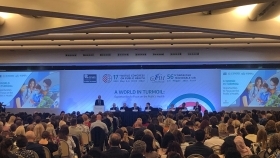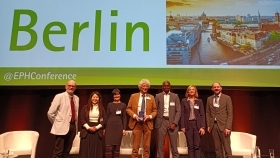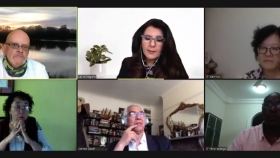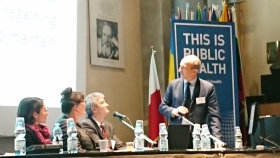
by strengthening education and training
of public health professionals
for both practice and research



The Association of Schools of Public Health in the European Region (ASPHER)
ASPHER is the key independent European organisation dedicated to strengthening the role of public health by improving education and training of public health professionals for both practice and research.Secretariat updates
ASPHER's Statement: Waive Vaccine Intellectual Property Rights Now has been adopted by the World Federation of Public Health Associations (WFPHA) and the Global Network for Academic Public (GNAPH)
Read the Summary statement below and download the PDF version here.
In the current global pandemic, vaccine equity means a fair distribution of vaccine, so that all countries can immunise their populations regardless of their income, pre-existing infrastructure, political context or economic development. People who live in low-and- middle- income countries are significantly less likely to have access to vaccination than those in high income countries, even if they are in the highest clinical risk groups or are health or care workers. COVID-19 vaccines significantly reduce the burden of serious illness, death, duration of symptoms and risk of transmission. Vaccination is our most important means to control the pandemic. Failure to control the level of virus circulating in communities increases the risk that new vaccine-resistant variants will emerge. This will prolong the pandemic for everyone.
We believe:
1. Current mechanisms of global vaccine delivery are welcome but not sufficient to address vaccine inequity: For low-and- middle- income countries, the main mechanism for vaccine delivery is through the vaccine pillar of the WHO access to covid-19 tools accelerator (ACT-A), specifically COVAX. COVAX is a key part of the WHO Preparedness and Response Plan for 2021-22. The intention is that 2 billion doses of vaccine will be delivered to 98 self-financing countries and 92 of the lowest income countries. We commend the international collaboration of COVAX for its vision, commitment, and expertise. It was never intended to be the sole solution for global COVID-19 vaccine provision and other efforts are required.
2. High income countries should fulfil their existing commitments to deliver their fair share of vaccines: Only Norway has so far done this.
3. Donation is not enough: It is not sustainable to expect that vaccine requirements for the majority of the world’s population should be met by donations from wealthy countries, even if all pledges were to be honoured in a timely fashion. There is also a risk of vaccine pollution- with substantial waste and/or dumping expiring products on third countries and on international programmes.
4. Vaccine supply arrangements must be built on equity of esteem: National and local teams in low- and middle-income countries have considerable experience in the successful delivery of mass vaccination and vaccination trials in challenging circumstances. Commercial protectionism from major pharmaceutical companies (and some countries) has combined with neo-colonial and paternalistic attitudes creating a narrative that suggests poor countries cannot produce vaccines in line with international quality standards; yet India is the largest producer of vaccine in the world.
5. Unwarranted export restrictions must be removed: Several countries, currently including the US, China, Japan, and South Korea have vaccine and/ or essential raw material export restrictions in place. Public health rather than commercial criteria should guide the balance between vaccine retention to manage surges and outbreaks and maintaining the pace of vaccine production across countries so that there is minimal disruption to the vaccination programmes in Low and Middle-Income Countries. 6. Production capacity must be expanded: Pandemic vaccination efforts are unlikely to remain a global one-time effort suitable for ad-hoc measures and coalitions of charitable donations. There is sufficient capacity for immediate distribution, but a more sustainable, scalable and geographically distributed global supply chain is required.
Optimising all alternative approaches to increasing supply and access to vaccine that do not require a TRIPS waiver (donation, improved distribution, concessions regarding licensing and acceptance of vaccine) will not produce vaccine coverage equivalent to high income countries until at least the end of 2022. There are enough doses of vaccine for everyone to be doubly vaccinated. Vaccine supply is artificially constrained and thus not reaching low-and-middle-income countries in a timely way because Trade-related intellectual property rights (TRIPS) enable certain pharmaceutical companies to monopolise the market, controlling the volume of production and the supply chain to countries.
7. There must be a Trade-Related Intellectual Property Rights (TRIPS) waiver now: We believe that implementation of a TRIPS waiver is essential to enable more countries to produce vaccines locally and achieve vaccine equity. The proposal is achievable and consistent with the initial Doha declaration of 2001 and the provisions added when it was updated. Doha recognises the right of countries that are members of the World Trade Organization (WTO) to use all the measures available under the TRIPS Agreement to protect public health, particularly to ensure the supply of medicines for all. This includes vaccines for all.
8. There is no place for commercial protectionism in the face of this humanitarian disaster: Public funding and public participation has been significant, in research and vaccine delivery. It is indefensible in this context for manufacturers to pursue commercial protectionism. A TRIPS waiver does not make the vaccine free because companies can still receive fair payment.
Companies' ability to set prices unaffordable to large parts of the world fuels public distrust, and the vaccine hesitancy argument that pharmaceutical companies are less interested in a safe, effective vaccine that will help bring the pandemic under control than in optimising short-term profits. A TRIPS waiver supports companies and governments in neutralising that argument.
9. A TRIPS waiver is an essential step on the way to new, more effective multilateral partnerships, not a permanent solution: It would enable greater global capacity to produce vaccines and a better response to the current COVID-19 pandemic.
10. There must be change in the future intellectual property environment for all current and future SARS-CoV-2 vaccines: More permanent solutions should be explored through the proposed new Global Treaty for Pandemic Preparedness to be discussed by the World Health Assembly in its Special session in November 2021. This will require to be implemented through the United Nations and its relevant international bodies, including the World Health Organisation and the World Trade Organisation.
In conclusion, delays in achieving adequate global coverage of COVID-19 will prolong the pandemic for all countries, leaving us all at risk of new, high consequence variants. It remains the case that we will not be free of this virus, until we are all free of it.
This statement summarizes the main points from the Full statement on the proposal for a waiver of the Trade-Related Aspects of Intellectual Property Rights (TRIPS Agreement), and related vaccine equity issues, available here: https://www.aspher.org/download/874/aspher_211019-trips-waiver-vr16-website-final.pdf Written by Alison McCallum, Abbe Brown, Meri Koivusalo and John Middleton, for the Association of Schools of Public Health in the European Region (ASPHER) COVID-19 task force, the Global Network for Academic Public Health, and the World Federation of Public Health Associations.
Terms of use · Transparency statement ·Tel: +32 2 735 0890 ·Skype: ASPHERskype ·Mail: office@aspher.org ·Share:
ADDRESS
Aspher SecretariatUM Brussels Campus
Av de l'Armée / Legerlaan 10
BE-1040 Brussels





